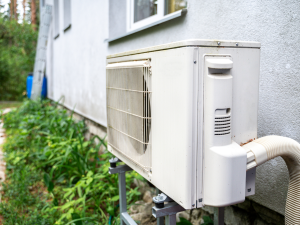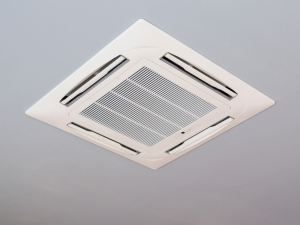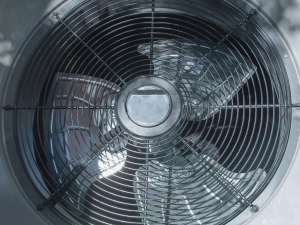When it’s time to install or replace the HVAC system, the question on most homeowners’ minds is: should I get a central air conditioner or a heat pump? Several factors determine which choice to go with, and there is no one right answer.
Below, we look at both options in detail and discuss the pros and cons of both a heat pump and a central AC. Hopefully, by the end of this article, you will have a clearer picture of which option is best for you.
The Basics of Heat Pump vs. AC
When it comes to cooling your home, heat pumps and air conditioners pretty much work the same way. They pull hot air and humidity from your home and move it outside with the help of a refrigerant. Both units use electricity to function, and they rely on your home’s ductwork to transfer heat from inside to outside.
But there is one difference between the two. While an AC specializes in cooling your home, a heat pump with AC can cool and heat your home. Let’s see how this is possible.
Heat Pump
A heat pump works on the principle that it’s easier to move heat than make it. A heat pump removes heat from your house during summer and takes it outside, and then reverses this process during winter.
A heat pump air conditioner has a unique reversing valve that switches the system from cooling to heating mode. During those cold months, it can pull enough heat from outside to heat your home at 70 degrees – as long as the temperature outside is above 30 degrees.
When the outdoor temperature dips to below 30, the heat pump activates its supplemental heat mode because there is no heat to pull. This supplemental heat source will be used to heat your home in the meantime until it runs out.
Pros of a Heat Pump
- No gas: Perhaps the biggest advantage of heat pumps is that they rely 100 percent on electricity, so you don’t need access to a gas or propane tank. As the world becomes more energy conscious, moving away from natural gas is a big step.
- Energy Efficiency: Under mild weather conditions, a heat pump puts out more cool and warm air than the amount of energy it takes to run daily. All it does is pull heat from the home or the outside and push it to the other side, a process that requires very little energy.
Speaking of energy efficiency, you can connect the heat pump to a solar energy system instead of using electricity.
- Even Distribution of Heat: Like the central AC, heat pumps use your home’s ductwork to distribute heat or cold air throughout your home. This reduces the number of cold or hot spots and keeps everyone comfortable.
- Ease of Maintenance: A heat pump requires less maintenance than an AC. You only need semi-annual check-ups and you are good to go.
Cons of Heat Pump
- Not Suitable for Freezing Climate: If you live somewhere that’s extremely cold, a heat pump will not be able to heat the home since there is zero heat outside. In such areas, you will still need to buy a supplemental heater or a gas furnace to keep your home warm.
- High Initial Cost: Regarding its day-to-day function, a heat pump is extremely pocket-friendly. However, the initial cost of purchasing and having one installed is quite high. On average, the cost of a good heat pump ranges between $5,800 and $30,000, depending on the type. This price tag can go even higher if your home doesn’t have ductwork already.
- Use of Electricity: The fact that heat pumps rely on electricity to work means you will have no heating or cooling if the power goes out. However, you can combat this problem by installing a solar-powered system to run the heat pump.
Air Conditioner
A central air conditioner does one thing and does it well – it keeps your home cool and comfortable when it’s hot outside. The AC relies on a refrigerant to pull the hot air and humidity from your home and move them outside before pushing back cool air into your house.
Air conditioners also use ductwork in your house, so cool air is distributed evenly throughout the entire house.
Pros of Air Conditioner
- You can adjust how cool you want your house to be, based on the weather outside and your preference.
- Air conditioner filters out pollen, dirt, and other allergens and sends back clean and fresh air.
- If you don’t have space, you can install a window AC, which is cheaper to buy and maintain.
Cons of Air Conditioner
- Air conditioners require regular maintenance to keep the system working efficiently. You need to replace filters every month or so and keep most of the components clean.
- You still need to install a furnace or a heater to warm the house during the cold months.
- Air conditioners rely on electricity, so you will be in for some trouble if the power goes out in the middle of summer.
Heat Pump vs. AC: Deciding Between the Two
Several considerations go into choosing between a heat pump and a central air conditioner.
Overall Weather
The weather conditions in your area matter a lot. If you have freezing winters and scorching summers, a heat pump will not be of any help. Heat pumps are more suitable for mild weather. Note, however, if you do choose an AC, you also have to purchase a furnace.
Cost
The cost of installing a heat pump is quite high. Do you have the budget for it? On the other hand, going with an AC means you might need a furnace if you don’t already have one. Do your cost analysis and see if it’s ideal to forego a heat pump for an AC unit and vice versa.
Conclusion
Finding the right HVAC system for your home is crucial. Hopefully, we have shed some light on the pros and cons of choosing either a heat pump or an air conditioner and made your decision easier.




